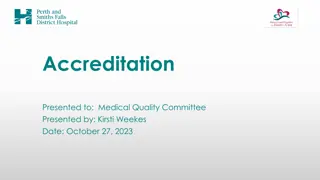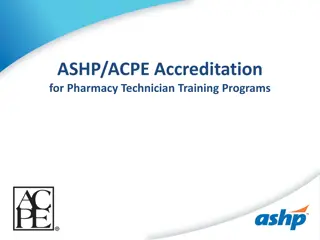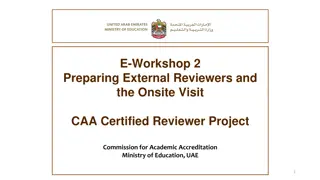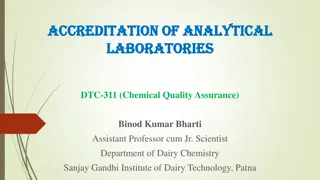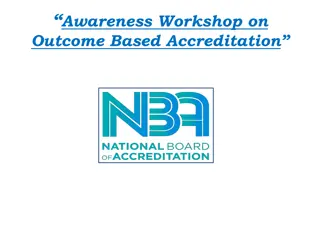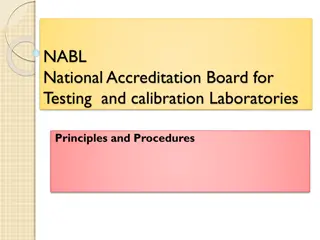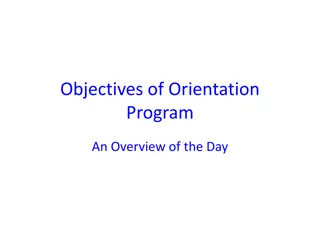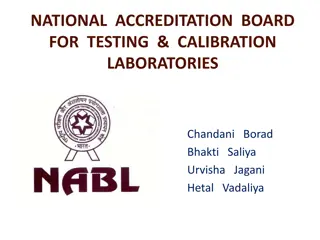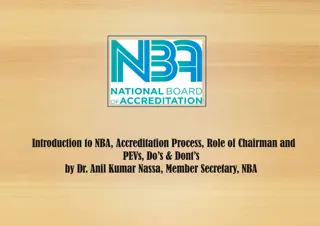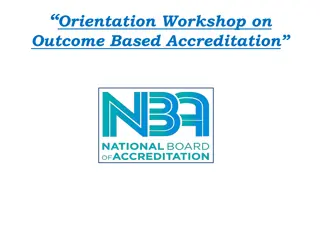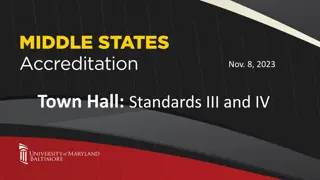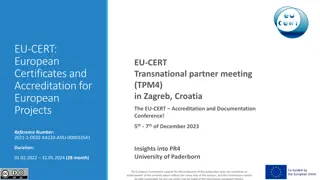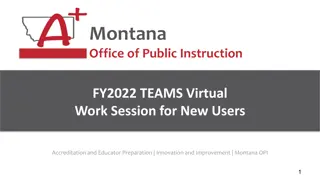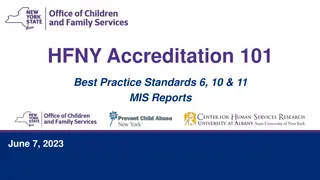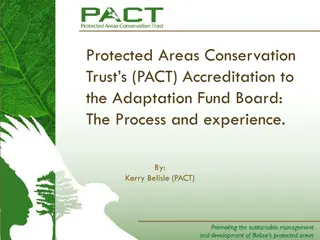National Qualifications Framework and Accreditation Process Overview
This content provides an in-depth look at the National Qualifications Framework (NQF) including various qualification types and levels. It also delves into the Accreditation Process for occupational qualifications, challenges faced, stakeholder engagement, and the stages applicants go through when seeking accreditation. The process involves online application, document uploads, and requirements such as OHS audit report, financial stability proof, and more.
Download Presentation

Please find below an Image/Link to download the presentation.
The content on the website is provided AS IS for your information and personal use only. It may not be sold, licensed, or shared on other websites without obtaining consent from the author.If you encounter any issues during the download, it is possible that the publisher has removed the file from their server.
You are allowed to download the files provided on this website for personal or commercial use, subject to the condition that they are used lawfully. All files are the property of their respective owners.
The content on the website is provided AS IS for your information and personal use only. It may not be sold, licensed, or shared on other websites without obtaining consent from the author.
E N D
Presentation Transcript
STAKEHOLDER ENGAGEMENT March 2023
Overview Qualifications on the OQSF Accreditation Process for Occupational Qualifications, Occupational Part- Qualifications and Occupational Skills Programmes Accreditation Challenges Learner Enrolment Quality Assurance
Qualifications on the OQSF New Qualifications Occupational Qualifications Historically Registered Qualifications (HRQs) Legacy Trades Occupational Part- Qualifications Provider Based Qualifications Occupational Skills Programmes Unit Standard Based Qualifications NATED 190/191 Historical Skills Programmes
National Qualifications Framework Level Sub-Frameworks and qualification types Doctoral Degree Doctoral Degree (Professional) 10 * Higher Education Qualifications Sub- Master s Degree Master s Degree (Professional) 9 * Framework (HEQSF) Bachelor Honours Degree Postgraduate Diploma Bachelor s Degree Specialised Occupational Diploma Occupational Qualifications Sub-Framework (OQSF) 8 Bachelor s Degree Advanced Diploma Advanced Occupational Diploma 7 Advanced Occupational Certificate Occupational Diploma Diploma 6 Advanced Certificate Higher Occupational Certificate 5 Higher Certificate National Occupational Certificate 4 National Certificate Intermediate Occupational Certificate 3 Intermediate Certificate Framework (GENFETQSF) Education and Training General and Further Qualifications Sub- Elementary Occupational Certificate 2 Elementary Certificate General Occupational Certificate 1 General Certificate
Accreditation Process Applicants complete an Online application form 1 The QCTO sends a link to applicants to upload their compliance documents 2 Applicants upload compliance documents within the prescribed timeframe 3
Accreditation Processcontinues Documents to be uploaded: External OHS Audit Report Proof of ownership/lease agreement Facilitator's CV, Qualification/s, ID copy Proof of Financial Stability(N/A Public institutions) Tax Compliance Status CIPC registration document MoU/SLA for Workplace Experience, Shared High-cost equipment, and resources Learning Material aligned to the Learning material matrix (Curriculum Documents)
Accreditation Processcontinues Desktop evaluation Evaluate uploaded Compliance documents Desktop Evaluation report Draft site visit schedule for approval 1 Site visit preparation Notification for site visit Site visit pack Confirmation for site visit Appointment of SME to conduct verification site visit 2 Site visit Physical or virtual verification site visit SMEs submit verification site visit report Verification site visit reports evaluated 3
Links for application of different QCTO Accreditations SDP may visit the QCTO website at: www.qcto.org.za to access the links on home page for example for Skills Programmes application under Quick Links.
Accreditation Challenges Use of application links Non-responsiveness of applicants (when requested to upload supporting documents) Use of consultants by SDP Last minute cancellation of site visit whereas internal logistics are completed Change of address for the site visit (different address to what is on the application) Applying for a lot of qualifications but fail to upload required documents for those qualifications NB: All SDPs are treated equally by the QCTO
Learner Enrolments: Full or Part Qualifications Enrolment Forms must be completed and submitted in two (2) stages per batch of learners per offered. DO NOT PDF the spread sheet at any time. FIRST STAGE Complete Columns A -AJ as well as date stamp in Columns AQ on Sheet 2 (QCTO Learner Enrolment Guideline Document) Submit to Learnerenrolments@qcto.org.za within 21-working days after the start date of the training. SECOND STAGE Update Columns AK -AP as well as date stamp and submit to the QCTO email address: EISAreadiness@qcto.org.za at least 3 months prior to anticipated EISA date. EISA dates and EISA enrolment closing dates can be found on the QCTO website https://www.qcto.org.za/learner-enrolment- and-eisa-registration-process.html SDPs should enrol learners for EISA as per dates allocated on the calendar, failure of which will lead to learners not being enrolled and not accepted to write the EISA. Learners can only be enrolled for EISA when they are ready to write by submitting enrolments to EISAreadiness@qcto.org.za using the LEISA file. Learners that are enrolled after the closing date will be included in the next scheduled EISA.
Learner Enrolments: Occupational Skills Programmes Enrol learners with the QCTO, in the required format, within 5 days of starting training/ RPL process (Learner Enrolment spread sheet, Tab 2, and Tab 3: A AK) (Learner Data Load Specifications for Skills Programmes) Final Integrated Summative Assessment (FISA) dates are set by the SDP, and captured on the learner enrolment spread sheet when submitting the spread sheet of learner enrolments to the QCTO to SPLearnerEnrolments@qcto.org.za within 5 days of starting Failure to do Step 2 within 5 days will result in non-compliance for quality assurance monitoring and registration of learners for the Final Integrated Supervised Assessment (FISA)
Quality Assurance Monitoring implementation of different qualifications by Skills Development Providers to verify compliance of SDP to QCTO quality standards. Curriculum Implementation for Occupational qualifications and Skills Programmes Programme Implementation of Historically Registered Qualifications (HRQs) Nated Report 190/191 N4- N6 Programme Implementation Nated Report 190/191 N4- N6 Examinations Monitoring EISA Conduct
Quality Assurance (QA) Process Flow 1 Accredited SDPs (Skills Development Providers) report learner enrolment and achievement to QCTO and the Quality Partner 1 Quality Assurance Unit develops monthly site visits schedule from reported enrolments 2 The SDP is contacted by the relevant QA Team Monitoring template is shared with the SDP before the visit for preparation SDP is monitored once in qualification delivery cycle/s 3
Quality Assurance (QA) Process Flowcontinues During monitoring, the report is completed and the findings are discussed with the SDP The report is signed by both parties (QCTO Official and the SDP) The finalised report is submitted to QCTO Senior Management, copy thereof is shared with SDP
QUESTIONS??? QUESTIONS??? QUESTIONS???
Thank You 256 Glyn Street, Hatfield, Pretoria, 0083 Private Bag X278, Pretoria, 0001 Tel: +27 12 003 1800 www.qcto.org.za QCTO Fraud and Ethics Hotline Toll-Free: 0800 111 894 SMS: 30916 qcto@thehotline.co.za Fax2Email: 086 726 1681 www.thehotline.co.za



